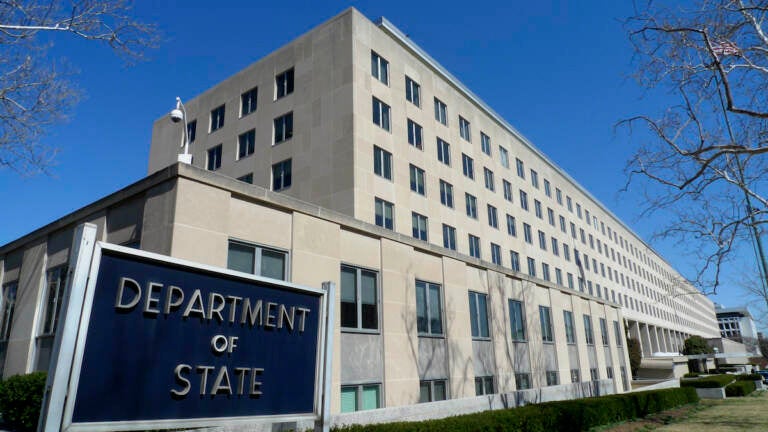Immigrants in Delaware question exclusion of some nations in diversity visa lottery
A program that awards immigrant visas via a lottery unfairly excludes those coming from specific countries, some Delaware advocates say.
Listen 1:31
File photo: The Harry S. Truman Building, headquarters for the State Department, is seen in Washington, in this March 9, 2009 file photo. (AP Photo/J. Scott Applewhite, File)
A program that awards immigrant visas via a lottery unfairly excludes those coming from specific countries, some Delaware advocates say.
More than 12 million people applied for the Diversity Immigrant Visa Program last year, according to the U.S. State Department. This year’s application process opened Oct. 5 and will close on Nov. 8, providing approximately 55,000 people the chance to win a Green Card through a lottery in which candidates will be chosen at random.
Candidates must have at least a high school diploma or have worked within the last five years, and have completed two years of training in order to be eligible. Applicants from countries with low rates of immigration to the U.S. are eligible, whether they reside abroad or in the states.
Countries not eligible this year include the following: Bangladesh, Brazil, Canada, China (including Hong Kong SAR), Colombia, Dominican Republic, El Salvador, Haiti, Honduras, India, Jamaica, Mexico, Nigeria, Pakistan, Philippines, Republic of Korea (South Korea), United Kingdom (except Northern Ireland) and its dependent territories, Venezuela, and Vietnam.
That exclusion seems unjust to people like Crystal Garland. The registered nurse from Newark, Delaware has roots in Jamaica and Panama. She said she knows many from South America, the Caribbean, and Jamaica who work hard and deserve to be able to provide for their families here.
According to Garland, requiring education is also unjust for those who don’t have access to educational opportunities in their own country.
“If they don’t have one, they should be able to come here to get an education. But I don’t think it should be required for them to already have one to come here as long as they are a law-abiding citizen,” Garland said. “I don’t feel like there’s any reason for them to not be able to.”
Maria Remolina, a Wilmington woman who arrived in the U.S. from Colombia on a tourist visa, came upon a TikTok video of a woman from South America celebrating the fact that she won a Green Card in the DV lottery, but she didn’t believe the lottery was a real thing.
“When I saw the video, I didn’t believe it. I was like, ‘okay, that’s fake,’” she said.
After some quick online research, Remolina quickly learned the visa lottery program was in fact real. She made plans to apply, only to discover her home nation of Colombia was one of several countries excluded.
She said everyone should have access to the program, regardless of where they’re from, adding that the opportunity should be better publicized.
The flaws of the lottery program highlight the need for Congress to pass broader immigration reform, said Carlos De Los Ramos, chairman of the Delaware Hispanic Commission.
“Immigration reform will help all immigrants to this country,” De Los Ramos said. “It would benefit those that do not qualify under the requirements of visas, like the lottery visa that we have right now, that is a requirement for you to have a high school diploma or to have a degree or to have a working background.”
“The reason why you are immigrating to the United States is because you have an economical need or a social need, so on,” he said. “That will be a challenge for those that do not have that educational background.”
He says immigrants will do anything rather than staying in their country where they may be at risk of starvation.
Ingrid Calvo migrated to the U.S. from Costa Rica five years ago with a high school diploma. The manager of Atexcac Mexican Restaurant in Newark said this is a place with many opportunities, a country that opens doors to whoever wants a better quality of life to support their families. She said as long as an individual is following the laws, they should be allowed to be here.
“Siempre he pensado que siempre que tú cumplas con el respeto a las leyes de este país, cualquier persona podría aplicar,” said Calvo. “Hay muchas situaciones que tomar en cuenta, por ejemplo el vandalismo en estos países a cómo las personas vienen aquí huyendo porque quieren una seguridad. Entonces, cómo todas estas cosas deberían de ser tratadas en cuenta, verdad? No por su estatus de pertenecer a X país.”
“I have always thought that as long as you respect the laws of this country, anyone could apply,” Calvo said. “There are many situations to take into account, for example the vandalism in these countries to how people come here fleeing because they want security. So how should all these things be taken into account, right? Not because of their status of belonging to X country.”
Calvo is one of many immigrants who became victims of a crime after moving here. She filed for legal assistance from the U.S. government, but her case is still open. She’s waiting for that to be resolved to find out if she will be allowed to stay in the U.S.
Even though she recognizes the lottery program is a great opportunity, she’s a believer that things are meant to be for a reason. For this reason, she is not applying for the lottery. She said if she were to be sent back to her home country, she would leave happy and appreciative. She encouraged others to take advantage of this opportunity if it benefits them.
Applications for the program can be filed on the Department of State’s website. Multiple applications submitted by the same person will be rejected. Candidates will be able to monitor the status of their entry starting May 6, 2023.
WHYY is your source for fact-based, in-depth journalism and information. As a nonprofit organization, we rely on financial support from readers like you. Please give today.







